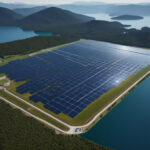Dublin is experiencing a surge in data centre development, positioning the city as a key player in the digital economy. However, this growth brings significant challenges regarding energy supply. With the rapid expansion of data centres in the region, critical discussions are arising about the sustainability of Ireland’s energy resources and their local impacts.
Data centres are facilities used to house computer systems and associated components, including servers, storage systems, and network equipment. As businesses increasingly shift towards cloud services and digital operations, the demand for data processing has skyrocketed, placing immense pressure on existing energy infrastructures. In Dublin, recent reports indicate that these facilities consume nearly 14% of the city’s electricity, a figure that is projected to rise sharply in the coming years.
One of the primary concerns is the potential strain on Ireland’s already stretched energy supply. The nation has committed to reducing greenhouse gas emissions as part of its environmental goals. A study conducted by the Irish Climate Action Plan reveals that data centres, due to their high energy demand, might hinder efforts to achieve these targets. As the country aims to generate a majority of its electricity from renewable sources by 2030, the reliance on fossil fuels to meet data centres’ energy needs raises issues about the sustainability of this growth.
The Irish government is faced with a balancing act: fostering economic growth while ensuring energy supply and sustainability. In response to rising energy demands, the Energy Regulator has released guidelines that call for stricter limits on energy consumption for new data centre projects. These regulations aim to promote the adoption of renewable energy sources among data centres, pushing companies to invest in energy efficiency technologies.
For instance, companies like Microsoft and Google are attempting to mitigate their carbon footprint by powering their data centres with wind and solar energy. Microsoft has pledged to be carbon negative by 2030, a commitment that requires significant investment in renewable energy sources. Similarly, Google aims to operate on 24/7 carbon-free energy at all its data centres by 2030.
Despite these initiatives, critics argue that the pace of growth for data centres in Dublin is outstripping the development of a supportive energy infrastructure. The practical implications are becoming increasingly evident: neighborhoods are experiencing power outages, and energy prices have surged as demand continues to exceed supply. Local communities have voiced concerns over the implications of data centre expansions on their quality of life, citing increased traffic, strain on public services, and environmental degradation.
The debate surrounding data centres also involves examining the economic benefits they bring. As the digital landscape evolves, these centres generate significant employment opportunities and attract high-tech investments into the region. Dublin, already a tech hub, stands to gain economically from continued success in this sector, but only with careful planning and execution.
The government, therefore, must consider innovative solutions to accommodate data centres while ensuring energy sustainability. Developing microgrids, enhancing energy storage technologies, and investing in smart grid systems can effectively balance energy supply and demand, providing a feasible path forward. Countries such as Denmark have led the way in integrating renewable energy into their data centre operations, setting an impactful example for Ireland.
Local authorities are also exploring the role of public and private partnerships in addressing these challenges. Collaborations between government entities and tech companies could drive the adoption of clean energy technologies while simultaneously enhancing infrastructure resilience to support growing data centre operations. Effective regulations and incentives for using renewable energy could facilitate this transition, ensuring economic growth does not come at an unsustainable cost.
While Dublin’s data centre boom presents substantial opportunities, it must be approached with caution. The path forward involves a comprehensive strategy that prioritizes energy sustainability without stifling economic potential. Policymakers, businesses, and the community must engage in an ongoing dialogue to create a balanced framework that allows for a thriving tech sector while preserving the environment and ensuring energy security for all.
Understanding the implications of Dublin’s data centre expansion is essential to navigating its future. The decisions made today will shape the technological landscape of tomorrow, ensuring that economic aspirations align with environmental sustainability.












